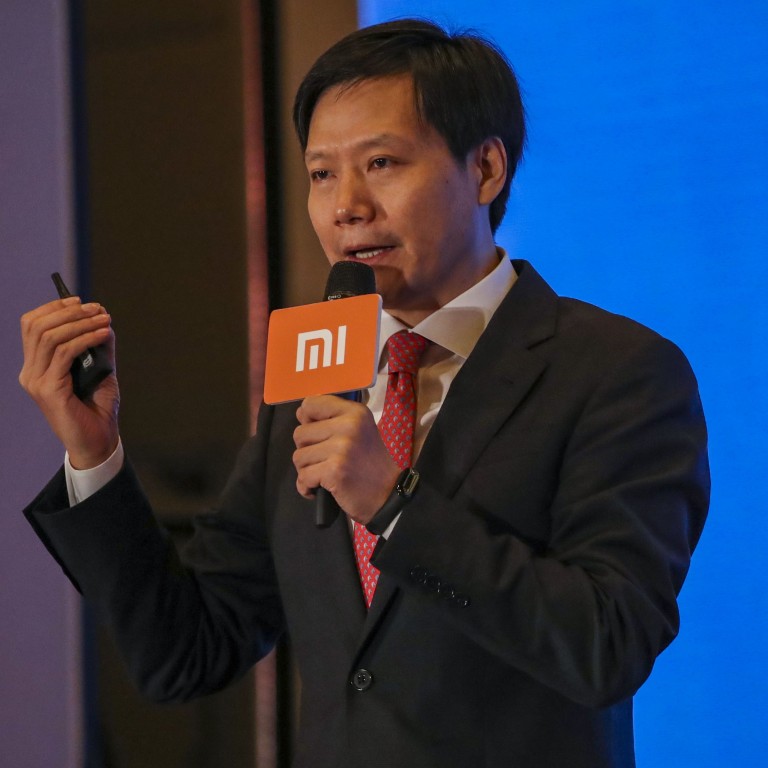
Xiaomi CEO Lei Jun silent on US expansion plan amid trade war, focuses on European markets
- Shift in focus reflects how the US-China trade war has knocked the wind out of the Chinese hi-tech industry’s sails
Smartphone giant Xiaomi Corp is looking to sharpen its operations in Europe this year, as the US-China trade war casts a shadow on its expansion plans in the world’s biggest economy.
“The European market is our main focus for international expansion this year,” Lei Jun, the chairman and chief executive of Hong Kong-listed Xiaomi, said in an interview in Beijing on Thursday, sidestepping a question about the firm’s activities in the US.
“We aim to rank [either] first or second in [the smartphone markets of] various European countries, especially in Spain,” he said.
That strategy is in stark contrast to the one declared by Xiaomi in March, when the goal was to expand its operations in the US by the end of last year or early this year. The company planned to launch a smartphone model tailored to the US market, with distribution supported by the country’s major mobile network operators.
The shift in strategy charted by Lei for Xiaomi reflects how the US-China trade war has knocked the wind out of the Chinese hi-tech industry’s sails. The conflict has threatened to slow down China’s expansion in everything from smartphones, wireless network equipment and self-driving cars to semiconductors, e-commerce and financial technology.
While a 90-day ceasefire period is in place for negotiators to end the war, major Chinese technology companies and national initiatives are expected to continue to face challenges this year as the world’s two largest economies remain at loggerheads over global leadership in hi-tech innovation.
In a company statement on Friday, Xiaomi pledged to invest over 10 billion yuan (US$148 million) in artificial intelligence (AI) and smart connected devices in the next five years. The company said it aimed to be driven by smartphones, AI and the Internet of Things (IoT) in future.
At Xiaomi’s annual company gathering, Lei said it is now facing external and internal challenges – namely US-China trade tensions and slower global demand for smartphones, and the need to ensure Xiaomi’s organisation and management can respond to the company’s rapid growth.
Lei’s new plans for Xiaomi, the world’s fourth largest smartphone supplier, has come amid a failed effort to stem a slide in its share price after the expiry of a six-month initial public offering lock-up period on Wednesday.
On the same day, Lei and the company’s two largest shareholders, Smart Mobile Holdings Limited and Smart Player Limited pledged not to sell any of their shares in the Beijing-based smartphone company for another year.
Shares of Xiaomi have fallen about 20 per cent in the past three trading days. The stock was down 3.58 per cent to close at HK$9.97 on Thursday. A broader tech slump has wiped out more than half of the company’s market value since its July high.

Despite the bearish market, Lei said he was confident that investors will see Xiaomi’s long-term value.
He said Xiaomi, which has businesses in 70 countries and territories outside China, maintains three geographic markets: the mainland, India and the rest of the world.
The company now derives 43.9 per cent of its revenue from overseas markets including India and Europe, where it has made significant expansion, according to the firm’s third-quarter financial results. Xiaomi has said that it wanted overseas business to account for 50 per cent of its total revenue.
Lei said the company also plans to enter markets in Africa and the Middle East.
Xiaomi, however, saw its domestic market share in smartphones decline to 13 per cent in the third quarter, down from 14 per cent a year earlier, according to Counterpoint Research.
That prompted the company to unveil in December a restructuring that created a new China team to put more focus on and “enhance investment in the China market”.
On Thursday, Xiaomi’s Redmi budget smartphone line was turned into a new sub-brand – a strategy that enables the company to pursue the high-end segment of the global market. The firm created the sub-brand Poco in India last year to target the premium segment of the world’s second largest smartphone market.

